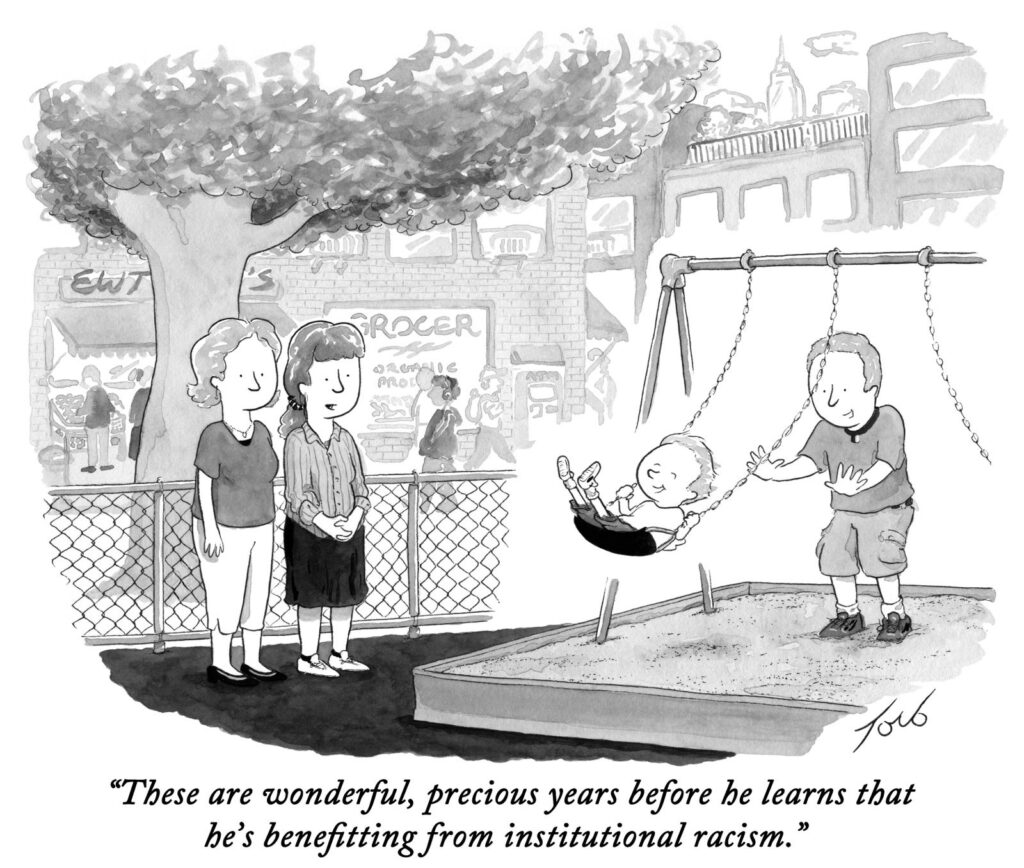
White progressives played a part in bringing this about. We’ll be better off—individually and collectively—if we face up to that.
Sure, Kamala Harris got within 1.5% of the votes. The election could have gone the other way. She might have bested Donald Trump.
But it was a long road to get to that moment three months ago. Trump and his congressional allies were on the ballot. Their agenda was unhidden—clear as day. So was the Democrats’ agenda. Side-by-side options. Democracy at its best.
On the other hand: Something feels terribly wrong about fascism being a choice. Something went wrong on the road to November 5, and all of us, or most of us, are implicated in that wrong. Being implicated explains why the opposition—in the present moment—is lukewarm. We’ve got to fight back; we’re going to fight back. But we’ll be fighting something in ourselves, and we’d best understand that.
The Biden/Harris years, after Black Lives Matter crested and then ebbed, witnessed a strange tolerance for fascism and the fascists. In the media, it was obvious. The heroic effort to prosecute the January 2021 putschists—a last-stand defense of democracy itself— was portrayed as one side of a 2-sided political battle.
That enabling was more than a failure of journalistic standards. It reflected a seeping-in of the personal core values and prejudices held by the journalists themselves, what those individuals share with the families and communities in which they live, what goes to their deepest sense of themselves.
I know this because I perceived the same thing in my own cohort, who are mostly writers and engineers and government functionaries. This failure of standards—moral standards—pervaded every aspect of upper-middle-class life. It manifested as a resigned even-handedness when it came to MAGA. An acceptance. An absence of a any fierce, uncompromising, risk-taking acts of condemnation—even among those who identify as progressive Democrats.
James Baldwin famously asked, back in the 1960s, why white people lie all the time.
I have this childhood memory of being on Franklin Street, which is the main downtown street of Chapel Hill, NC, in the late spring of 1967. I was eight years old—almost nine.
On the sidewalk, I’d been hailed by a lady who I didn’t recognize, but who recognized me. She knew who I was, and who my parents were. She had grey curly beauty-parlor hair and kind of leaned over me. I had to turn my head up to look at her, or else I’d be overwhelmed by her perfume and the pleats in her sensible skirt. She asked me the normal questions an adult might ask of a child. How did I like school? Was I excited that the Tarheels were headed for the playoffs?
Then she turned the conversation to school integration. The hair stood up on the back of my pale, skinny neck. I tried to talk plain and stay focused on the principle of the thing, which at that time—to eight-year-old me—was that people ought to be able to send their kids to any school, no matter what color they were. This was personal.
It occurred to me, there on the downtown sidewalk, that the reason she’d stopped me was not just to say hello to a child she recognized, but because my family were integrationists. My sisters and I were the first white kids to ever attend Northside Elementary, and now the Federal government was mandating that the whole school system be integrated the following fall.
“Well, I just wish we could all just get along,” she said.
I didn’t like the way she said that. It sounded like—was meant to sound like—everybody should just be Southern nice to each other. But I sensed what she really meant: Everybody should stay in their place. Was I wrong in sensing that?
No, I wasn’t wrong. She went on:
“I just think we would all get along just fine if people from outside didn’t stir up trouble.”
I knew very well what she meant by that. Kids had called me called “Yankee” from the moment my family arrived in Chapel Hill, two years before. We were outsiders, all right. “I think we would all get along just fine” was meant to ostracize. To threaten.
The lady moved on.
The rest of my family didn’t get it. My mom and my sisters, they were girls, and my dad taught at UNC and was disengaged from family life. Out on the school playground, and out on the street, I came to learn exactly what was going on.
To be sure, I was being bullied for a lot of reasons: I raised my hand in class too often. I was small; I’d been put ahead a year. I was bookish and fearful; my accent was different. I didn’t have a big brother or a dad who was around.
There was something else to it, too. I knew it whenever I heard “communist” as my head was being pushed into the dirt, or “n***-lover” as my guts were being pummeled and my eyes blackened.
“He gets into a lot of fights,” my sisters would say. “Maybe we should sign him up for a boxing gym,” my dad would offer.
I was going to have to figure out the mystery of this social landscape for myself.
“I wish we could all just get along,” the lady had said. Maybe that was the key. The phrase carries what’s called (today) virtue-signaling, while also putting up a coded, steely defense of keeping things the way they are. It deprecates anyone who protests. Shuts up anyone who makes a fuss. Shames anyone too visible as a victim. It keeps the peace.
A couple of years later, shortly after I turned eleven, I was in the school hallway, coming in from recess. A kid with a blond crew cut helped me with a clue. “Hey hippie,” he called to me. Other kids called me that—I’d grown my hair out past Beatle-length—but this kid was weirder, angrier. Something about him scared me.
“I’m not afraid of you,” I said. I was lying.
“You oughta be afraid, hippie. My dad’s in the Klan. He’ll kill you.” I turned away and headed for class. If I was going to fight anybody, I wasn’t going to fight this kid. And I wasn’t going to tell anyone what he’d said to me, either.
He’d filled in some of the mystery, though, that I’d been left with from the encounter with lady on Franklin Street. And what he said answered James Baldwin’s question, when I encountered that question years later.
American society smolders with racial injustice and with the ever-present threat of racial violence. That fact is the key to understanding most things about politics, about understanding most things that matter. It’s at the very heart of a phrase like “I wish we could all get along”— a phrase that, in the mouth of a liberal, artfully combines virtue-signaling with an implicit endorsement of white racist terror.
Until now, after the election, and perhaps even still, this was the stance most liberals had toward MAGA, at least the MAGA adherents in their workplaces, or among their neighbors, or the parents on their kids’ sports teams. Toward local shopkeepers and the local police. There has been a kind of acceptance, even as the MAGA rhetoric became more extreme and the potential of a takeover of national government emerged: Let’s all get along.
White people, including liberal upper-middle-class college-educated white people, really do want a kinder and more egalitarian society, but they aren’t entirely comfortable with the idea that Black people could be in charge of it, or parts of it, and would be making decisions. They aren’t comfortable with no longer being deferred to, with no longer having a safe bubble, with no longer enjoying special protections from the denials and penalties and danger and all the other vagaries of life under capitalism. Something in them knows that this privilege is what is really at stake. Black political power would mean those privileges would go away, quickly.
You hear this discomfort in the derogation of “identity politics,” “woke,” “wokism,” and “culture wars.” You hear it in the hyped-up fear of crime and support for tougher penalties and crackdowns—even, for example, in California voters’ recent refusal to ban forced prison labor.
You see it most clearly in the obfuscation of the racial divide in voting, in the misrepresentation of white voters as “rural” or “heartland” or “working class.” (All of these categories include Black voters, who vote reliably and overwhelmingly Democratic.) You see it in all the efforts to represent MAGA as anything other than what it is and always has been—a white supremacist ideology and program.
Most egregiously, you see it in the specious (and patronizing) claim that MAGA voters are dupes and fools, or that they didn’t intend to vote for what is happening in Washington today. There is no evidence of that, and there is plenty of anecdotal evidence available to argue for the contrary: Just ask any MAGA you know how they feel about the rounding up of immigrants or the dismantling of DEI programs.
When “we all get along,” liberal white people get to have it both ways. They can support racial equality and progress while also enjoying an assured continuation of their privilege, courtesy of the ongoing presence of a source of racist terror. And this—ultimately—is why liberal white people tolerate a MAGA presence among their families, their associates, coworkers, and clients. Among their local police.
It is, to answer Baldwin’s question (in a way that would not surprise him at all), why white people lie so much.
Of course, tolerance is required, sometimes. I like to go backpacking in the mountains. Many times, I’ve emerged on a road 40 or 50 miles from where I left the car, and I’ve needed to hitchhike back on rural mountain roads. There’s a vulnerability to being picked up on the side of the road, a vulnerability that’s shared with the person offering a ride—you each don’t know each other or what you’re up to—and on a lot of occasions I’ve respected that vulnerability by keeping my mouth shut in the face of racist, right-wing rants, letting my white skin and some noncommittal phrases anonymize and protect me until I got where I was going. It’s the way it is.
But even required tolerance is still a lie. Still corrosive to principle.
During the Biden/Harris era, in the wake of Black Lives Matter, tolerance for MAGA prevailed. Red hats were allowed where white hoods were once banned. Fewk liberal Democrats would stick their finger in the face of a MAGA and tell them they are racist and they can go to hell.
This makes the present government (if you can call it a government) a group project, a consensus project. People on our side, the progressive side, might not approve of MAGA; they might have voted against it, but they also legitimized it, allowed it to be part of social reality and because of its accepted presence, allowed it to be part of political discourse. They provided an accommodation the MAGAs were only too willing to exploit, and the accommodation helped provide the space for the MAGAs to organize, win power, and dismantle the democracy that had come to threaten white privilege. For white progressives what is happening in Washington is, in the most important sense, our project as well as theirs.




